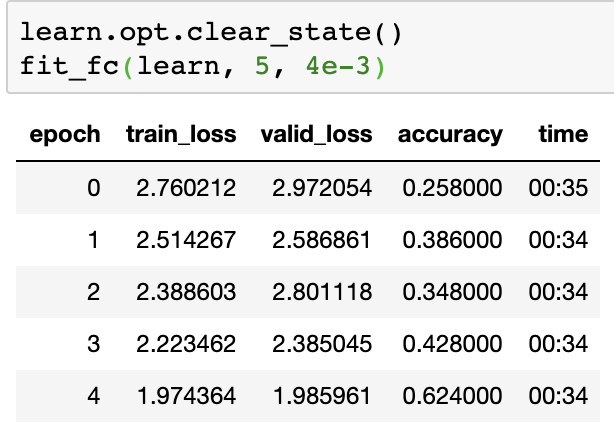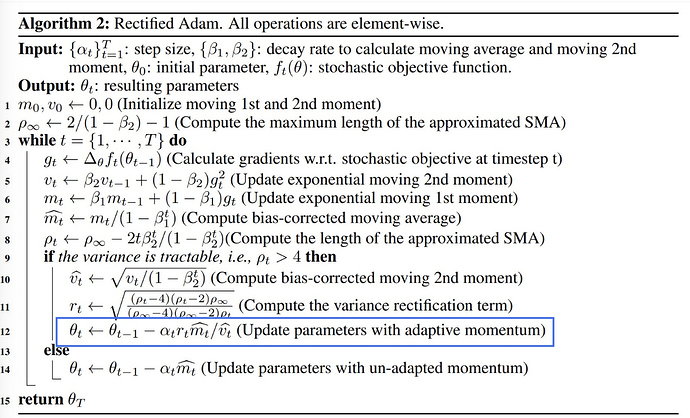QHAdam
Below is a rough version of QHAdam which can be then used with the Lookahead wrapper to give RangerQH. The parameter update definitely could be refactored to be more efficient/elegant
def opt_func(ps, lr=defaults.lr): return Lookahead(QHAdam(ps, lr=lr, wd=1e-2,mom=0.9, eps=1e-6))
def qhadam_step(p, lr, mom, sqr_mom, sqr_avg, nus, step, grad_avg, eps, **kwargs):
nu_1 = nus[0]
nu_2 = nus[1]
debias1 = debias(mom, 1-mom, step)
debias2 = debias(sqr_mom, 1-sqr_mom, step)
num = (((1-nu_1) * p.grad.data) + (nu_1 * (grad_avg / debias1)))
denom = ( ((1 - nu_2) * (p.grad.data)**2) + (nu_2 * (sqr_avg / debias2))).sqrt() + eps
p.data = p.data - lr * (num / denom)
return p
def QHAdam(params, lr=1e-3, mom=0.9, sqr_mom=0.99, nus=[(.7, 1.0)], eps=1e-8, wd=0., decouple_wd=False):
from functools import partial
steppers = [weight_decay] if decouple_wd else [l2_reg]
steppers.append(qhadam_step)
stats = [average_grad, average_sqr_grad, step_stat]
return Optimizer(params, steppers, stats=stats, lr=lr, nus=nus, mom=mom, > sqr_mom=sqr_mom, eps=eps, wd=wd)
Testing fastai Ranger v fastai2 Ranger
I tried removing all the transformations and shuffling in v1 and v2 for a fair comparison between both, but I keep getting an error when trying to remove all of the transforms in item_img_tfms in fastai2, I guess I need to get more familiar with the new data api. For fastai2 I used AffineCoordTfm to do the resizing as I had seen Jeremy do it in the kaggle RSNA comp. Happy to test both for Ranger if I can get fastai2 to give me images with no transforms 
fastai2 data (gives error)
src = Path(‘data/imagewoof/imagewoof’)
items = get_image_files(src)
split_idx = GrandparentSplitter(valid_name=‘val’)(items)
tfms = [[PILImage.create], [parent_label, lbl_dict.getitem, Categorize()]]
item_img_tfms = [ToTensor()]
dsrc = DataSource(items, tfms, splits=split_idx)
batch_tfms = [Cuda(), IntToFloatTensor(), Normalize(*imagenet_stats)]
dbunch = dsrc.databunch(shuffle_train=False, after_batch=batch_tfms+[AffineCoordTfm(size=128)], bs=64)
fastai v1 data
n_gpus = num_distrib() or 1
nw = min(8, num_cpus()//n_gpus)
img_ls = ImageList.from_folder(src).split_by_folder(valid=‘val’).label_from_folder()
img_ls = img_ls.transform(([flip_lr(p=0.0)], ), size=128)
data =img_ls.databunch(bs=64, num_workers=nw).normalize(imagenet_stats)
data.train_dl = data.train_dl.new(shuffle=False)
 (let me see if I can figure it out too). I think I may have found something. I believe that on line 11, v should be:
(let me see if I can figure it out too). I think I may have found something. I believe that on line 11, v should be: 



 I put in the fix for the one ReLU that wasn’t being changed to Mish so all the pieces are now (should be) natively there for us to try and play with.
I put in the fix for the one ReLU that wasn’t being changed to Mish so all the pieces are now (should be) natively there for us to try and play with.